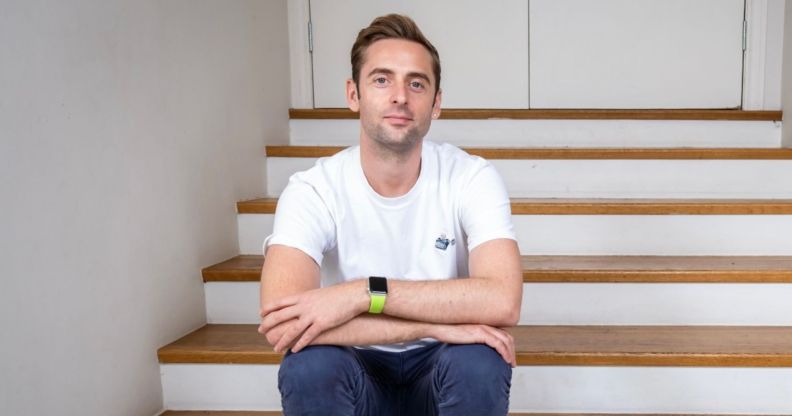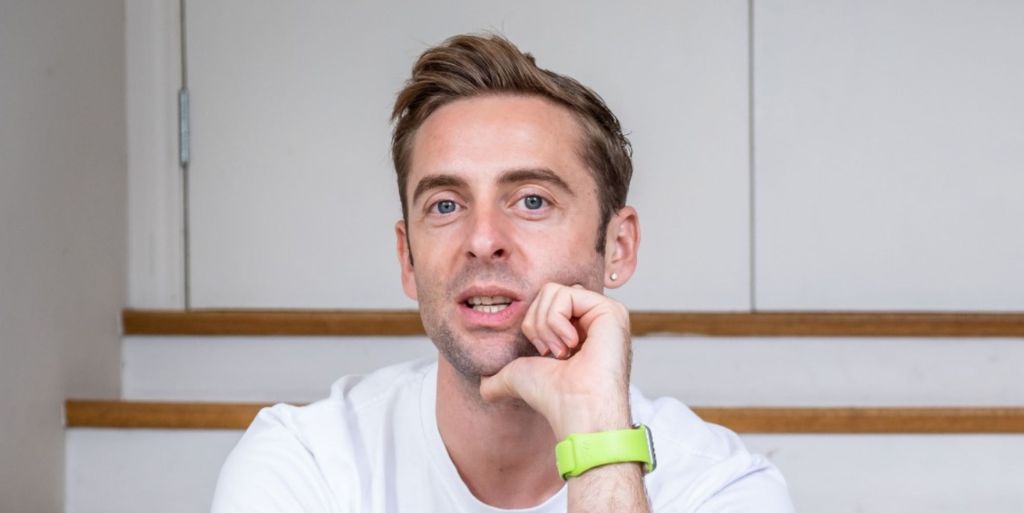I spoke to my parents, straight friends and a porn star about being gay. Here’s what I learned

Daniel Harding says too many gay men are “scared of the straight man”. (Supplied)
Last summer, Daniel Harding came out against the “toxic” term “gay best friend” – a label he wore with unease after coming out at age 18.
“The concept of the GBF implies – and constantly reminds you – that while they are normal, you are not. You are the other,” Daniel wrote in an article for Cosmopolitan.
He explained how the label, though well-intentioned, can be damaging and hurtful, pressuring many young gay men to pigeonhole themselves in a two-dimensional stereotype.
After it was published, dozens of other gay men got in touch to share their disdain for the phrase
“I got so much feedback from that feature,” Daniel tells PinkNews. “What it sparked was, actually, there’s so much that we just don’t talk about.”
The response inspired Daniel’s book, Gay Man Talking: All the Conversations We Never Had. In it, he talks with his parents, straight friends and lovers about gay stereotypes, sex, homophobia and coming out – they’re the sort of chats he wishes he had growing up.
“I decided to be awkward, have these cringeworthy conversations and actually find out how people really feel,” he explains. “What it uncovered is that you shouldn’t come out and shut up, you should come out and keep talking.”
Daniel spoke to PinkNews about coming out, having difficult conversations and finding contentment as a gay man.
PinkNews: If you’d had these awkward conversations when you came out, how might things have changed for you?
It would just have enabled me to live a more open life and perhaps I wouldn’t have struggled. You go through so many different things and challenges as part of the LGBTQ+ community and to not be able to have conversations with people who you’re closest with out of fear is quite damaging.
Do you think it creates a barrier between LGBTQ+ people and our loved ones, by not having these conversations?
I think it’s an invisible barrier because it’s one that you don’t realise is there. You skirt around so many things. Actually, I think what it does is plaster over real feelings. There’s probably conversations that I didn’t have with my dad during those times because we just felt: Well, let’s not go there.

Gay Man Talking covers everything from gay shame and stigma to intimate relationships. One conversation you have is with porn star and sexual health activist Jason Domino. What were you hoping to get from that?
I grew up in a household where sex was a bit of a swear word. We didn’t really talk about sex, we didn’t really think about sex. So to have a conversation with someone who is so sex-positive, it was really interesting and uncomfortable – and fantastic at the same time.
I felt very, like – not a prude – but I don’t wear sex on the sleeve. I was really fascinated to understand from their point of view how they viewed sex, if it was an emotional attachment, and how they became to be so sex-positive.
I’ve actually, since talking to people in the community, realised how much we do need to embrace sex. I think that sex especially can have this really negative connotation – we’re linked to it constantly. We are over-sexualised, we’re seen as promiscuous but we should also be really positive about it. It’s just sex, and sex is fine to talk about.
You also spoke to one of your friends, Adam, who is straight. Why was that important to include?
I viewed [heterosexual men] as like an animal that didn’t want to speak to us, [that] had a problem before I even opened my mouth, and a breed of person that I was scared of to be honest.
It was fascinating to speak to a guy who is a friend and just to hear his views on it. He was actually really passionate. He was like, ‘I’m so defensive, I’m uber supportive.’ Some people might argue it’s a dated feeling, that we shouldn’t be afraid of the straight man. But the more I talk to people, the more people are still afraid. In hetero places, you still can feel a bit guarded. Unfortunately, that is just society – we are still scared of the straight man.
These conversations about the gay experience are important, but what would you say to someone who says that as a cis, white gay man, you are well ahead of the rest of the community in terms of these conversations and acceptance?
I was very lucky to have two accepting parents. Yes, we went through a bit of a bad time, but they ultimately accepted me and wanted the best for me. That’s why in the book, I do, in the parents’ chapter, also include an interview with someone who is Muslim, and whose parents didn’t accept him. That was really important.
It was really important for me in the role model section to have a breakout bit of different voices within the community, from a trans person to someone from a BAME background, to have that diversity. We’ve not all had the same experiences. There’s definitely people who are privileged.
By no means is the book one size fits all. Everyone’s going to have their own journey. I’m very much aware of my privilege and I’m here to hopefully be a voice to support people, minorities, and to raise awareness and get people talking.
Do you see yourself and your identity as a gay man differently after writing this book?
Absolutely. I’ve hid behind so many different faces just because I was a different person to my parents, as I was to my friends, as I was to work colleagues, as I was to lovers. I was exhausted with being multiple people to feel comfortable. What I realised is when you have these conversations, that person [who is] millions of different people slowly becomes one. You become more able to answer the question, ‘who am I?’. It’s about finding that acceptance and finding contentment with who you are.
Now that you’ve had these discussions with your loved ones, do you find that you can be more open with them?
Absolutely. It’s opened a new can of worms in that people want to ask more questions and find out more. I think our biggest ally is the heterosexual community – be that a friend, be it family, be it someone of influence. I feel like they should be having these conversations with us and understanding both sides. I think this has totally changed my relationships for the better.
How did this story make you feel?

